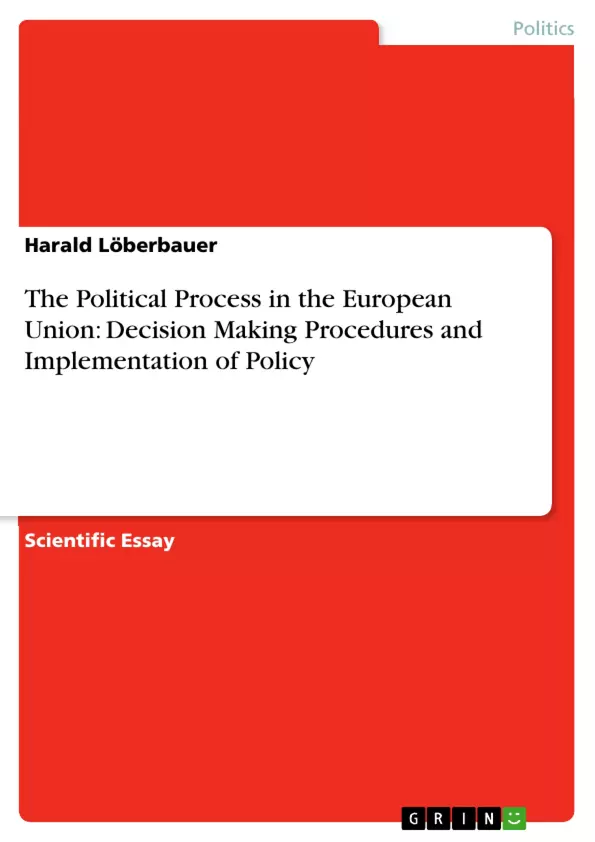Answers two major questions:
1. To what extent can one say that the Council and the EP are on an “equal footing” in the legislative process?
2. The member state level and the European (EU) level do not work separately but constantly “overlap” in the EU decision-making process (for example by way of committees). Do you agree and how could one practically illustrate this trend of “interaction” between the different levels?
Inhaltsverzeichnis (Table of Contents)
- Question 1
- Multi-level Governance
- Comitology
- Conclusion
Zielsetzung und Themenschwerpunkte (Objectives and Key Themes)
This paper examines the interplay between the member state level and the European Union (EU) level in the EU decision-making process. It specifically focuses on the concept of multi-level governance and the role of committees in this process.
- The relationship between member states and the EU in decision-making
- The concept of multi-level governance in the EU
- The role of committees in EU decision-making
- The interplay of state sovereignty and EU integration
- The impact of comitology on the EU decision-making process
Zusammenfassung der Kapitel (Chapter Summaries)
The paper starts by addressing the question of how the member state level and the EU level interact in the decision-making process. It defines multi-level governance and examines its relevance in the EU context, emphasizing the principle of subsidiarity. The paper then delves into the concept of comitology, explaining its purpose and the role of committees as a forum for dialogue between member states and EU institutions.
Schlüsselwörter (Keywords)
Multi-level governance, European Union, decision-making, committees, comitology, state sovereignty, subsidiarity, flexible integration, international relations theory, unimultipolar theory.
Frequently Asked Questions
Are the Council and the European Parliament on an equal footing?
The paper examines the extent to which these two institutions share power in the legislative process, particularly through the ordinary legislative procedure where both must agree on a proposal for it to become law.
What is Multi-level Governance in the EU?
Multi-level governance refers to the idea that decision-making power in the EU is shared between the European, national, and sub-national levels, rather than being centralized in a single authority.
What is the role of committees in EU decision-making?
Committees serve as a vital forum for dialogue and interaction between member state representatives and EU institutions, facilitating the technical and political negotiation of policies.
What does the term 'comitology' mean?
Comitology refers to the set of procedures through which EU member states control how the European Commission implements EU law, typically involving committees of representatives from member states.
How does the principle of subsidiarity relate to EU integration?
Subsidiarity ensures that decisions are taken as closely as possible to the citizen, meaning the EU should only act when national, regional, or local action is less effective.
- Quote paper
- Harald Löberbauer (Author), 2005, The Political Process in the European Union: Decision Making Procedures and Implementation of Policy, Munich, GRIN Verlag, https://www.grin.com/document/58633



